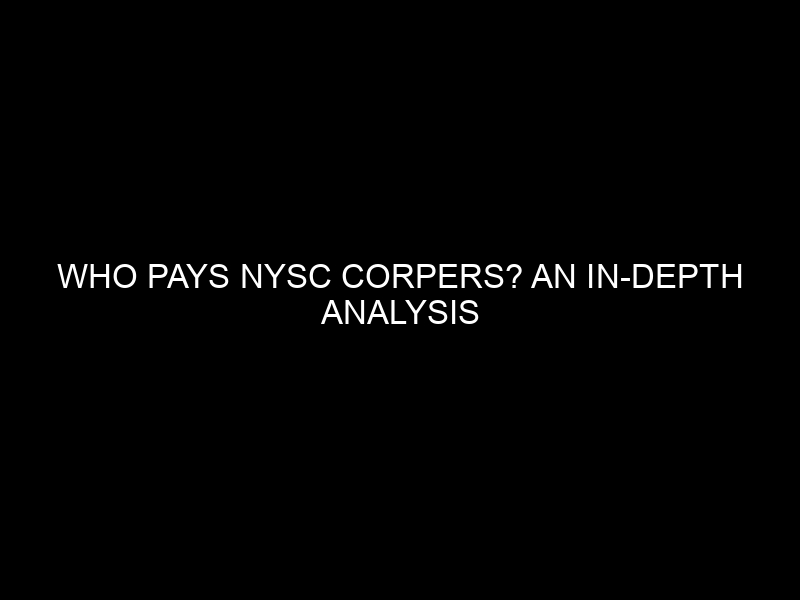The National Youth Service Corps (NYSC), established in 1973, is a program set up by the Nigerian government to involve the country’s graduates in the development of the country. Since its inception, there has been a recurrent inquiry that seems not to fade – “Who pays NYSC Corpers?” This question is as fundamental as the program itself, considering that the financial aspect of the service year is crucial to the participants, known as Corps members. Understanding the financial dynamics, including the sources and structure of the payments to NYSC members, is not only essential for the Corpers themselves but also for educational institutions, policy advocates, and the general public.
Who is Responsible for Paying NYSC Corpers?
The body responsible for paying NYSC Corpers is primarily the Federal Government of Nigeria. The government, through the NYSC scheme, ensures that all Corps members receive a monthly allowance, commonly referred to as “allawee,” from the beginning to the end of their service year. This payment is regarded as a basic sustenance allowance and is meant to aid Corpers in covering basic needs.
However, it’s worth noting that in some cases, Corpers are paid additional stipends by the state governments or the private/public organizations where they are posted. The nature and amount of these stipends can vary significantly depending on several factors such as the economic robustness of the state, the financial strength of the organization, and the policy framework governing such entities in relation to the NYSC scheme.
Understanding the Payment Structure: Federal Government Allowances
The Federal Government’s allowance to NYSC members is standardized across the country; every Corper, irrespective of the state of deployment or place of primary assignment (PPA), receives the same amount from the Federal Government. As of my last update, the monthly allowance provided by the Federal Government stands at around 33,000 Naira, though this figure is subject to changes influenced by broader economic factors like inflation and governmental policy decisions.
The allowance is disbursed monthly through the Central Bank of Nigeria (CBN), which remits the funds directly to the bank accounts of Corps members. It’s imperative for all Corpers to have a functional Nigerian bank account for this purpose.
State Governments and Private Sector Contributions
Beyond the federal allowance, some state governments make supplementary payments to Corpers. These payments are usually influenced by the state’s financial capabilities and policies. For instance, states with higher revenue may decide to pay Corpers posted in their region an extra allowance, while others with tighter budgets may not afford to do so. The amount varies from state to state and from time to time. It’s also common practice for states to offer higher allowances to Corpers serving in specialized sectors such as health and education, recognizing the critical nature of these sectors.
Additionally, Corpers posted to private organizations might receive stipends from these bodies, although this is at the organization’s discretion. Some public and private organizations include these payments in their corporate social responsibility programs, while others embed them in their operational costs. The disparity in these additional payments underscores the importance of the NYSC’s posting lottery, as it influences the financial experience of the Corps members during their service year.
The Economic Implications of the NYSC Allowance
The sustenance allowance offered to NYSC members has broader economic implications. Firstly, it supports the basic financial independence of recent graduates, potentially easing the unemployment burden in the country. Secondly, it encourages graduates to contribute meaningfully to community development, thereby indirectly fostering national growth.
However, there are challenges. The allowance, although helpful, is often criticized for being meager and insufficient to cover the basic needs, especially in cities with high living costs. This has brought to the fore discussions about the need for a periodic review of the allowance, taking into consideration the country’s current economic realities.
Conclusion
In conclusion, the financial structure supporting the NYSC program is a multi-tiered system involving federal, state, and sometimes, organizational inputs. The sustenance allowance, though considered insufficient by many, plays a crucial role in the lives of recent graduates, offering a form of financial buffer during the transition from school to the labor market. While the program has its criticisms, its financial benefits, no matter how minimal, provide relief for several Corps members and their families. It’s essential for prospective Corpers to understand these dynamics to set realistic expectations for their service year.
Frequently Asked Questions (FAQs) about NYSC Corpers’ Allowance
How often do NYSC Corpers receive their allowance?
NYSC Corpers receive their federal allowance monthly. However, the timing of additional stipends from state governments or private organizations varies per the policies of the paying bodies.
Are there deductions from the NYSC allowance?
Generally, there are no deductions from the federal allowance. However, Corpers are advised to review the terms of any additional payments from states or private organizations, as terms may vary.
Can NYSC Corpers negotiate their allowances?
Corpers cannot negotiate their federal allowance as it is standardized. However, allowances from states and private organizations are subject to the policies of those entities and may sometimes be negotiable, typically when Corpers have specialized skills that are in high demand.
What happens if an NYSC Corper doesn’t receive their allowance?
Any Corper who doesn’t receive their allowance as at when due should report to the appropriate NYSC officials. Non-payment can occur for reasons ranging from administrative errors to banking issues.
References:
- National Youth Service Corps (NYSC) – nysc.gov.ng
- Central Bank of Nigeria (CBN) – cbn.gov.ng

